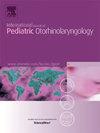Linguistic analysis of letters of recommendation for pediatric otolaryngology: A pilot study
IF 1.2
4区 医学
Q3 OTORHINOLARYNGOLOGY
International journal of pediatric otorhinolaryngology
Pub Date : 2024-09-27
DOI:10.1016/j.ijporl.2024.112121
引用次数: 0
Abstract
Objectives
To analyze the language of letters of recommendation for pediatric otolaryngology fellowship for possible gender and/or racial bias. To refine methodology for future investigation of gender and language within letters of recommendation for pediatric otolaryngology fellowship.
Methods
Practicing pediatric otolaryngologists were recruited as survey participants. A total of 10 letters of recommendation were screened to represent an equal number of applicants who identify as male and female and an equal number of applicants who identify as White and applicants who identify as Black, Indigenous, or a Person of Color. Names, pronouns, location, and other identifying information were removed from the letters. Survey participants were asked to read each letter and categorize the applicant's gender and race as well as that of the letter writer. The letters were also subject to analysis by WordStat linguistic software.
Results
A total of 35 pediatric otolaryngologists participated in the survey. Participants assigned gender of the applicant correctly in 43 % of letters and gender of the letter writer correctly in 53 % of letters. Race of the applicant was judged correctly in 65 % of letters. Participants indicated words such as caring, hard-working, and prepared led them to assume the applicant was female, which was corroborated by linguistic analysis. No such words were identified as predictive of race.
Conclusion
This pilot study suggests that while there are certain linguistic associations with gender among applications to pediatric otolaryngology fellowship, they may not impact biases held by the reader. This is relevant given a recent rise in the number of female applicants to this subspecialty and ongoing unfilled fellowship positions. Future studies are needed to determine if such associations exist and ultimately affect match potential and success within the field. These studies will require analysis of more letters and with more survey respondents, along with a higher in-depth linguistic analysis.
Lay summary
This pilot study aims to evaluate letters of recommendation for pediatric otolaryngology fellowship applications for gender bias with the goal of outlining future studies. There were certain words associated with a given gender, which could impact applicants’ potential to match.
Level of evidence
NA.
小儿耳鼻喉科推荐信的语言分析:试点研究。
目的分析小儿耳鼻喉科研究员推荐信的语言,以发现可能存在的性别和/或种族偏见。完善今后调查小儿耳鼻喉科研究员推荐信中的性别和语言的方法:招募儿科耳鼻喉科执业医师作为调查对象。共筛选了 10 封推荐信,其中男性和女性申请人人数相等,白人和黑人、土著或有色人种申请人人数相等。信件中的姓名、代词、地点和其他身份识别信息均已删除。调查参与者被要求阅读每封信,并对申请人的性别和种族以及写信人的性别和种族进行分类。这些信件还通过 WordStat 语言软件进行了分析:共有 35 名儿科耳鼻喉科医生参与了调查。在 43% 的信件中,参与者对申请人性别的判断是正确的;在 53% 的信件中,参与者对写信人性别的判断是正确的。65%的信件正确判断了申请人的种族。参与者表示,关爱、勤奋和有准备等词语会让他们认为申请人是女性,这一点在语言分析中得到了证实。没有发现此类词语可以预测种族:这项试验性研究表明,虽然在小儿耳鼻喉科研究员的申请中,性别与语言有一定的联系,但它们可能不会影响读者的偏见。考虑到最近申请该亚专科的女性人数增加以及目前尚未填补的研究员职位,这一点很有意义。今后还需要进行研究,以确定这种关联是否存在,并最终影响匹配潜力和在该领域的成功。这些研究将需要对更多的信件和更多的调查对象进行分析,并进行更深入的语言分析。报告摘要:本试验性研究旨在评估小儿耳鼻喉科研究金申请推荐信中的性别偏见,目的是勾勒出未来研究的轮廓。有一些词与特定性别相关,这可能会影响申请人的匹配潜力:不适用。
本文章由计算机程序翻译,如有差异,请以英文原文为准。
求助全文
约1分钟内获得全文
求助全文
来源期刊
CiteScore
3.20
自引率
6.70%
发文量
276
审稿时长
62 days
期刊介绍:
The purpose of the International Journal of Pediatric Otorhinolaryngology is to concentrate and disseminate information concerning prevention, cure and care of otorhinolaryngological disorders in infants and children due to developmental, degenerative, infectious, neoplastic, traumatic, social, psychiatric and economic causes. The Journal provides a medium for clinical and basic contributions in all of the areas of pediatric otorhinolaryngology. This includes medical and surgical otology, bronchoesophagology, laryngology, rhinology, diseases of the head and neck, and disorders of communication, including voice, speech and language disorders.

 求助内容:
求助内容: 应助结果提醒方式:
应助结果提醒方式:


